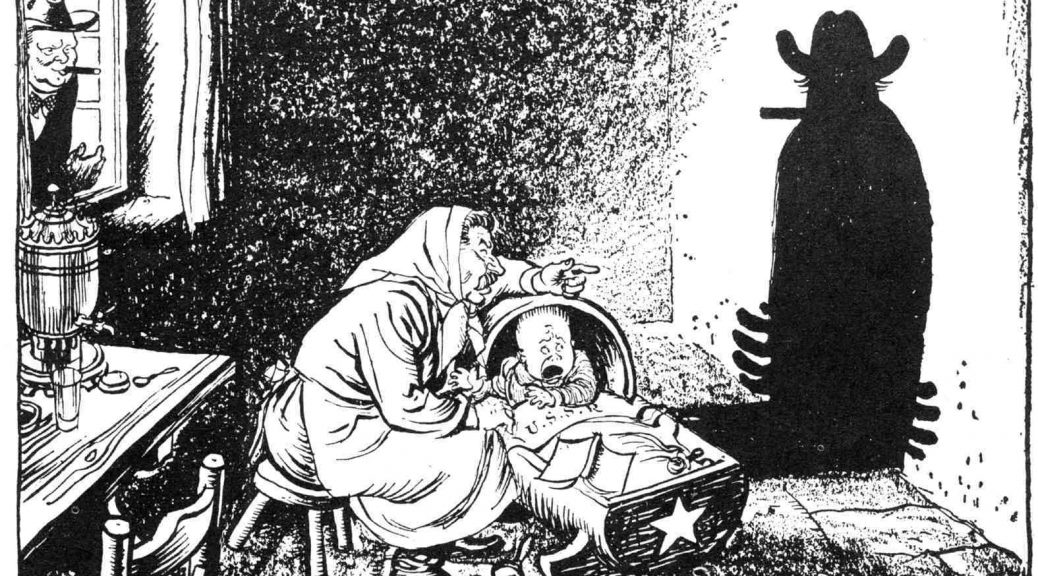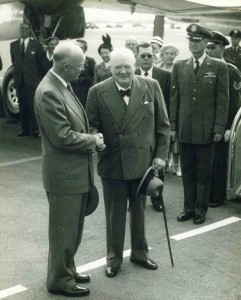
Winston Churchill on War, Part 2: Atomic Age
Atomic peril (continued from Part 1…)
Early on, some regarded the atomic bomb as just another weapon of war. Churchill himself spoke privately of using it, or threatening to use it, to roll back Soviet advances in Europe in 1946-47. This was not on the plenary level. By early 1948 he was pushing for a negotiated settlement with Russia.
At the 1953 Bermuda conference the British delegation was astonished to find that President Eisenhower, and his Secretary of State, John Foster Dulles, still regarded the bomb as conventional. It was, they said, just another improvement in military hardware. With the arrival of the hydrogen bomb, Churchill’s thoughts became apocalyptic. He tried in vain to arrange a “summit” with the Americans and Stalin’s successor, Georgy Malenkov.
1945
These were his words on war and peace at the end of the Second World War:
This revelation of the secrets of nature, long mercifully withheld from man, should arouse the most solemn reflections in the mind and conscience of every human being capable of comprehension. —1945, 6 August, House of Commons
The bomb brought peace, but men alone can keep that peace, and henceforward they will keep it under penalties which threaten the survival not only of civilization but of humanity itself. —1945, 16 August, House of Commons
Peace and Cold War
As divisions with Russia deepened after the war, atomic research continued and Churchill offered ominous warnings:
The atomic bomb is still only in the hands of a State and nation which we know will never use it except in the cause of right and freedom. But it may well be that in a few years this awful agency of destruction will be widespread and the catastrophe following from its use by several warring nations will not only bring to an end all that we call civilization but may possibly disintegrate the globe itself. —1946, 19 September, Zurich University
If we….firmly grasp the larger hopes of humanity, then it may be that we shall move into a happier sunlit age, when all the little children who are now growing up in this tormented world may find themselves not the victors nor the vanquished in the fleeting triumphs of one country over another in the bloody turmoil of destructive war, but the heirs of all the treasures of the past and the masters of all the science, the abundance and the glories of the future. —1948, 7 May, Congress of Europe, The Hague
“Century of the Common Man”?
….little did we guess that what has been called The Century of the Common Man would witness as its outstanding feature more common men killing each other with greater facilities than any other five centuries put together in the history of the world. —1949, 31 March, Massachusetts Institute of Technology
Appeasement…from weakness and fear is alike futile and fatal. Appeasement from strength is magnanimous and noble and might be the surest and perhaps the only path to world peace. —1950, 14 December, House of Commons
The human race is going through tormenting convulsions, and there is a profound longing for some breathing space, for some pause in the frenzy. —1951, 8 October, Broadcast, London
Passing through infinity

By the time he met Eisenhower in Bermuda in 1953, the Soviets had an atomic bomb and were on the way to its next iteration. WSC spoke of what became “Mutual Assured Destruction.” Would it be enough to keep the peace? Churchill wondered.
I have since heard it said that certain mathematical quantities when they pass through infinity, change their signs from plus to minus—or the other way round. It may be that his rule may have a novel application, and that when the advance of destructive weapons enables everyone to kill everybody else, nobody will want to kill anyone at all. —1953, 3 November, House of Commons
Summitry
When I meet Malenkov we can build for peace.…[Eisenhower] doesn’t think any good can come from talks with the Russians. But it will pay him to come along with us. I shall do what I can to persuade him. —1953, 3 December, Hamilton, Bermuda
[Dulles says] nothing but evil can come out of meeting with Malenkov. Dulles is a terrible handicap. Ten years ago I could have dealt with him. Even as it is I have not been defeated by this bastard. I have been humiliated by my own decay. —1953, 7 December, Hamilton, Bermuda
Then it may well be that we shall by a process of sublime irony have reached a stage in this story where safety will be the sturdy child of terror, and survival the twin brother of annihilation.…The [nuclear] deterrent does not cover the case of lunatics or dictators in the mood of Hitler when he found himself in his final dug-out. That is a blank…. —1955, 1 March, House of Commons.
A bomb in the hands of lunatics is, alas, the blank we still may be facing.
Concluded in Part 3…







One thought on “Winston Churchill on War, Part 2: Atomic Age”
Words of wisdom are needed more than ever in this turbulent time of accelerated change.Churchill`s words and thoughts are missed in today`s world, where good leadership is urgently required.
Comments are closed.